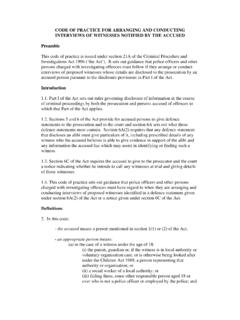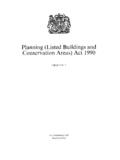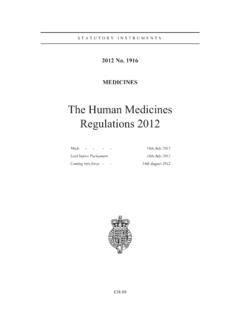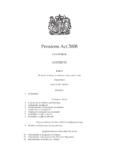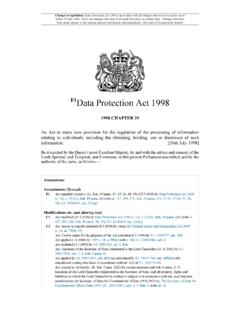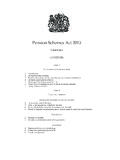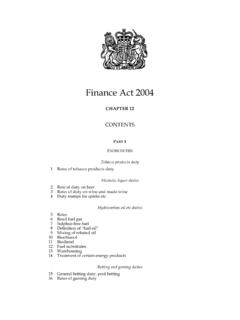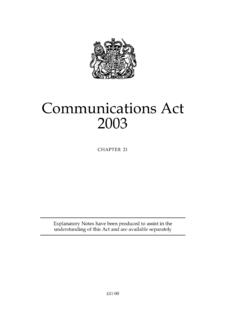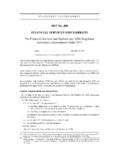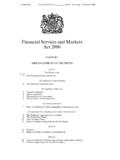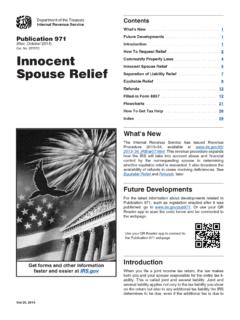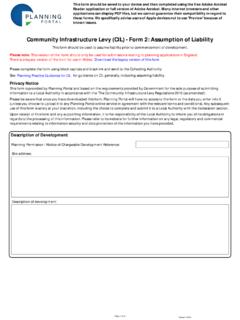Transcription of Occupiers’ Liability Act 1957
1 Changes to legislation: There are currently no known outstanding effectsfor the Occupiers Liability Act 1957. (See end of Document for details)Occupiers Liability Act 19571957 CHAPTER 31 5 and 6 Eliz 2An Act to amend the law of England and Wales as to the Liability of occupiers and othersfor injury or damage resulting to persons or goods lawfully on any land or other propertyfrom dangers due to the state of the property or to things done or omitted to be donethere, to make provision as to the operation in relation to the Crown of laws made bythe Parliament of Northern Ireland for similar purposes or otherwise amending the lawof tort, and for purposes connected therewith.[6th June 1957]Annotations:Extent InformationE1 For the extent of this Act see s.
2 8(2)Modifications etc. (not altering text)C1 Act modified (with effect as stated in s. 1(2)-(4) of the amending Act) by 2002 c. i, ss. 12(1)(4), 42,(with ss. 38, 39) Liability in tort1 Preliminary(1)The rules enacted by the two next following sections shall have effect, in place of therules of the common law, to regulate the duty which an occupier of premises owes tohis visitors in respect of dangers due to the state of the premises or to things done oromitted to be done on them.(2)The rules so enacted shall regulate the nature of the duty imposed by law inconsequence of a person s occupation or control of premises and of any invitationor permission he gives (or is to be treated as giving) to another to enter or use thepremises, but they shall not alter the rules of the common law as to the persons onwhom a duty is so imposed or to whom it is owed; and accordingly for the purpose ofthe rules so enacted the persons who are to be treated as an occupier and as his visitors2 Occupiers Liability Act 1957 (c.)
3 31)Document Generated: 2017-08-23 Changes to legislation: There are currently no known outstanding effectsfor the Occupiers Liability Act 1957. (See end of Document for details)are the same (subject to subsection (4) of this section) as the persons who would atcommon law be treated as an occupier and as his invitees or licensees.(3)The rules so enacted in relation to an occupier of premises and his visitors shall alsoapply, in like manner and to the like extent as the principles applicable at common lawto an occupier of premises and his invitees or licensees would apply, to regulate (a)the obligations of a person occupying or having control over any fixed ormoveable structure, including any vessel, vehicle or aircraft; and(b)the obligations of a person occupying or having control over any premises orstructure in respect of damage to property, including the property of personswho are not themselves his visitors.
4 [F1(4)A person entering any premises in exercise of rights conferred by virtue of (a)section 2(1) of the Countryside and Rights of Way Act 2000, or(b)an access agreement or order under the National Parks and Access to theCountryside Act 1949,is not, for the purposes of this Act, a visitor of the occupier of the premises.]Annotations:Amendments (Textual)F1S. 1(4) substituted ( for E., for W.) by Countryside and Rights of Way Act 2000(c. 37), ss. 13(1), 103(3) (with s. 43); 2004/2173, art. 2(1)(c); 2005/423, art. 2(c)2 Extent of occupier s ordinary duty(1)An occupier of premises owes the same duty, the common duty of care , to all hisvisitors, except in so far as he is free to and does extend, restrict, modify or excludehis duty to any visitor or visitors by agreement or otherwise.
5 (2)The common duty of care is a duty to take such care as in all the circumstances of thecase is reasonable to see that the visitor will be reasonably safe in using the premisesfor the purposes for which he is invited or permitted by the occupier to be there.(3)The circumstances relevant for the present purpose include the degree of care, andof want of care, which would ordinarily be looked for in such a visitor, so that (forexample) in proper cases (a)an occupier must be prepared for children to be less careful than adults; and(b)an occupier may expect that a person, in the exercise of his calling, willappreciate and guard against any special risks ordinarily incident to it, so faras the occupier leaves him free to do so.(4)In determining whether the occupier of premises has discharged the common duty ofcare to a visitor, regard is to be had to all the circumstances, so that (for example) (a)where damage is caused to a visitor by a danger of which he had been warnedby the occupier , the warning is not to be treated without more as absolvingthe occupier from Liability , unless in all the circumstances it was enough toenable the visitor to be reasonably safe.
6 And(b)where damage is caused to a visitor by a danger due to the faulty execution ofany work of construction, maintenance or repair by an independent contractoremployed by the occupier , the occupier is not to be treated without more asanswerable for the danger if in all the circumstances he had acted reasonablyOccupiers Liability Act 1957 (c. 31)Document Generated: 2017-08-233 Changes to legislation: There are currently no known outstanding effectsfor the Occupiers Liability Act 1957. (See end of Document for details)in entrusting the work to an independent contractor and had taken such steps(if any) as he reasonably ought in order to satisfy himself that the contractorwas competent and that the work had been properly done.(5)The common duty of care does not impose on an occupier any obligation to a visitorin respect of risks willingly accepted as his by the visitor (the question whether a riskwas so accepted to be decided on the same principles as in other cases in which oneperson owes a duty of care to another).
7 (6)For the purposes of this section, persons who enter premises for any purpose in theexercise of a right conferred by law are to be treated as permitted by the occupier tobe there for that purpose, whether they in fact have his permission or of contract on occupier s Liability to third party.(1)Where an occupier of premises is bound by contract to permit persons who arestrangers to the contract to enter or use the premises, the duty of care which he owesto them as his visitors cannot be restricted or excluded by that contract, but (subjectto any provision of the contract to the contrary) shall include the duty to perform hisobligations under the contract, whether undertaken for their protection or not, in so faras those obligations go beyond the obligations otherwise involved in that duty.
8 (2)A contract shall not by virtue of this section have the effect, unless it expresslyso provides, of making an occupier who has taken all reasonable care answerableto strangers to the contract for dangers due to the faulty execution of any work ofconstruction, maintenance or repair or other like operation by persons other thanhimself, his servants and persons acting under his direction and control.(3)In this section stranger to the contract means a person not for the time being entitledto the benefit of the contract as a party to it or as the successor by assignment orotherwise of a party to it, and accordingly includes a party to the contract who hasceased to be so entitled.(4)Where by the terms or conditions governing any tenancy (including a statutory tenancywhich does not in law amount to a tenancy) either the landlord or the tenant is bound,though not by contract, to permit persons to enter or use premises of which he is theoccupier, this section shall apply as if the tenancy were a contract between the landlordand the tenant.
9 (5)This section, in so far as it prevents the common duty of care from being restrictedor excluded, applies to contracts entered into and tenancies created before thecommencement of this Act, as well as to those entered into or created after itscommencement; but, in so far as it enlarges the duty owed by an occupier beyondthe common duty of care, it shall have effect only in relation to obligations which areundertaken after that commencement or which are renewed by agreement (whetherexpress or implied) after that .. F2 Annotations:Amendments (Textual)F2s. 4 repealed by Defective Premises Act 1972 (c. 35),s. 6(4)4 Occupiers Liability Act 1957 (c. 31)Document Generated: 2017-08-23 Changes to legislation: There are currently no known outstanding effectsfor the Occupiers Liability Act 1957.
10 (See end of Document for details) Liability in contract5 Implied term in contracts.(1)Where persons enter or use, or bring or send goods to, any premises in exercise of aright conferred by contract with a person occupying or having control of the premises,the duty he owes them in respect of dangers due to the state of the premises or tothings done or omitted to be done on them, in so far as the duty depends on a term tobe implied in the contract by reason of its conferring that right, shall be the commonduty of care.(2)The foregoing subsection shall apply to fixed and moveable structures as it appliesto premises.(3)This section does not affect the obligations imposed on a person by or by virtue ofany contract for the hire of, or for the carriage for reward of persons or goods in, anyvehicle, vessel, aircraft or other means of transport, or by or by virtue of any contractof bailment.
